Abstract
The paper presents results of a comparative study of psychologic and pedagogic conditions of pre-school education in several regions of Russian Federation. The psychologic and pedagogic conditions are considered as key factors of development and education of pre-school children. The study of these conditions is an essential component of an assessment of quality of pre-school education in Russian Federation. The research method comprised the main characteristics of the psychologic and pedagogic conditions of pre-school education: presence of full-time educating psychologists in a pre-school educational institution; presence of full-time educating logopedists and defectologists in a pre-school educational institution; use of a practice of the involvement in the educational process of educators from the institutions of additional education, culture and sport; availability of special equipped rooms and places for educational activity of children; availability of special equipped rooms and places for gaming activity of children; application of computers and digital resources in the course of education; number of offered additional educational services; the requirement of supplied additional educational services. The findings of this study allowed a realization of a comparative study of psychologic and pedagogic conditions of pre-school education in several regions of Russian Federation and to identify common dynamics of individual characteristics over the past few years. The resulting information is open and available to managers and specialists of pre-school education, to parents of pre-school children, as well as to the general public.
Keywords: Pre-school educationpsychologic and pedagogic conditions of pre-school educationassessment of the quality of pre-school education
Introduction
The psychologic and pedagogic conditions are the key characteristics of the development and the education of pre-school children.
N. V. Ippolitova and N. S. Sterkhova summarized the materials of a number of studies concerning analysis of psychologic and pedagogic conditions and found that these conditions are discussed by researchers as the «conditions designed to provide certain pedagogical procedures to influence personal development of subjects or objects of a pedagogical process (i.e. of educators or children), causing the improvement of the efficiency of an educational process» (Ippolitova & Sterkhova., 2012, p. 12).
V. V. Rubtsov and E.G. Yudina refer to the «main psychologic and pedagogic conditions of pre-school education:
personality-oriented interaction of adults with children;
full communication of a child with the older, coeval and younger children;
developing pedagogical technologies focused on the specifics of age and based on the assimilation of cultural means of activity at a certain age;
subject-spatial environment stimulating a communicative, gaming, cognitive, physical and other activities of a child, which are organized depending on the age specifics of its development;
selection possibility for all educational subjects (i.e for educators, children and their parents) of educational programs, of pedagogical technologies, materials and cultural-developed means of activity» (Rubtsov & Yudina, 2010, p. 16).
The research analysis concerning the solution of implementation issues of psychologic and pedagogic conditions, undertaken by N. V. Ippolitova and N. S. Sterkhova, showed that «these conditions have following features:
psychological and pedagogical conditions are considered by scientists as a set of possibilities of the educational and of the subject-spatial environment, the use of which enhances the efficiency of the integral pedagogical process;
set of procedures of the provided influence on the development of personality, which are described as psychological and pedagogical conditions, targets primarily the development of the identity of subjects of the pedagogical system, what ensures the successful solution of tasks of the integral pedagogical process;
main function of psychological and pedagogical conditions is the organization of procedures of pedagogical interaction, which provide the transformation of the specific characteristics of development, education and training (learning) of a personality, i.e. this procedures affect the personal aspect of the pedagogical system;
set of psychological and pedagogical conditions is selected with concideration of structure of the transforming personal characteristic of the subject of the pedagogical process» (Ippolitova & Sterkhova, 2012, p. 12).
According to A. A. Buyanov, «the psychological and pedagogical conditions can have an accelerating or inhibiting effect on the processes of the processes of formation and development of a pre-school child, as well as on the dynamics and results of these processes» (Buyanov, 2018, p. 7).
Therefore, the psychological and pedagogical conditions of the pre-school education are one of the cornerstones that determine the efficiency of the educational process. This fact makes them a mandatory area of study in the case of the assessment of the quality of the pre-school education. Based on this position, we have included the key area of evaluation «the psychological and pedagogical conditions of the pre-school education» into the method of the assessment of the quality of the pre-school education in regions of Russian Federation.
Problem Statement
According to A. G. Asmolov and V. T. Kudryavtsev, «over the past twenty years, the country has developed a system of pre-school education, that which can no longer exist in a mode other than the one described in terms of «variability», «development» and «innovation». The standard program was replaced by variable programs, different types and forms of pre-school educational institutions are taken place instead of unified kindergartens» (Asmolov & Kudryavtsev, 2016). Based on the opinion of A. I. Adamsky, that means «until the control system changes, we cannot realize the state standard of preschool education» (Sleptsova, 2018, p. 15), a method is needed for the assessment of quality of today's system of the pre-school education. The identification of the psychological and pedagogical conditions of this system can be understood as one of the main priorities.
Research Questions
The present study targeted following purposes:
to collect the initial data collection of kindergartens in several regions of Russian Federation;
to compare the received data with the similar data from previous studies, held within the framework of the assessment of quality of pre-school education;
to ensure openness and availability of received information for the specialists of the pre-school education, for parents of pre-school children, as well as for the general public.
Purpose of the Study
The purpose of the present study was an implementation of a comparative study of psychologic and pedagogic conditions of pre-school education in several regions of Russian Federation.
Research Methods
The methodology used in the present study included characteristics of psychological and pedagogical conditions of the pre-school education. The following key characteristics that determine the effectivity of psychological and pedagogical conditions will be considered in the present paper:
presence of full-time educating psychologists in a pre-school educational institution;
presence of full-time educating logopedists and defectologists in a pre-school educational institution;
use of a practice of the involvement in the educational process of educators from the institutions of additional education, culture and sport;
availability of special equipped rooms and places for educational activity of children;
availability of special equipped rooms and places for gaming activity of children;
application of IT tools and sources in the course of education;
the number of offered additional educational services;
requirement of additional educational services.
The present study involved 8970 pre-school educational organizations from 57 regions of Russian Federation. The decision to participate in the study was made by institutions of pre-school education on a voluntary basis.
As a result of the data collection on these specific characteristics we compared the findings of present study with findings of similar researches from previous years 2012, 2013, 2014 and 2015. Thanks to the possibility of comparison, we were able to identify the trend of quality changes of pre-school education according to these characteristics.
Findings
The dynamics of results concerning the key characteristic «presence of full-time educating psychologists in a pre-school educational institution» is present on the Figure
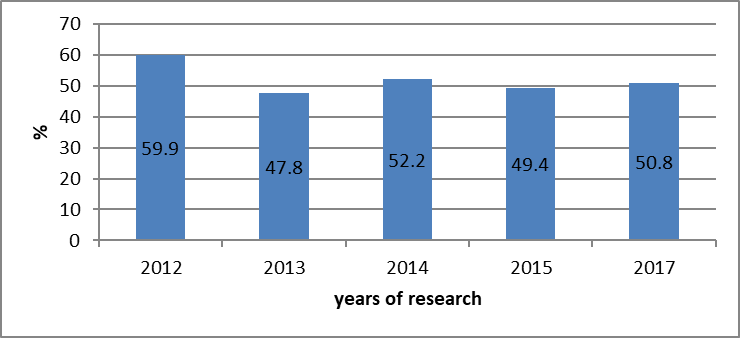
The highest value of the characteristic «presence of full-time educating psychologists in a pre-school educational institution» was given in 2012, as 1198 (i.e. 59.9%) out of all 2001 kindergartens participated on the research had in their state one or more full-time educating psychologists. In the next years, the intensity of this characteristic fluctuates at the mark of 50%. So, only 1689 of 3536 kindergartens, it means only 47.8% of kindergartens took part in the study, had one educating psychologist in each of their own states – it was the minimum of characteristic value during the total (all the) time of the research. One educating psychologist was present in the state of 2086 (i.e. 52.2%) of all 3997 participated pre-school educating organizations in 2014. In 2015, only 3552 of 7187 kindergartens, that is 49.4%, had a full-time educating psychologist. And only 4560 kindergartens (i.e. 50.8%) of all 8970 study participants had in the own state at least one educating psychologist in 2017.
The findings concerning the key characteristic «presence of full-time educating psychologists in a pre-school educational institution» are shown on the Figure
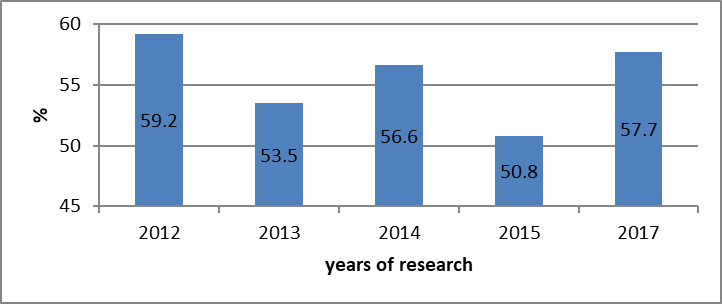
The maximum value of the characteristic «presence of full-time educating logopedists and defectologists in a pre-school educational institution» falls on the study of the year 2012, as in the state of 1185 of all 2001 kindergartens participated in the study (i.e. 59.5%) was at least one of the specialists of these specified profiles. The value of the characteristic decreased in 2013 by about 5%: only 1890, that is 53.5%, out of participating 3536 kindergartens had these specialists in their state. The study of the year 2014 showed that the value of this characteristic slightly increased up to 56.6% it means already 2262 of 3997 kindergartens featured these specialists. In 2015, a minimum of the characteristic value (50.8%) was registered: logopedists and defectologists were present only in the state of 3647 out of 7187 kindergartens involved in the study. The number of kindergartens staffed by these specialists, increased up to 5171 kindergartens, that is 57.7% of all 8970 studied kindergartens.
Results obtained regarding the key characteristic «use of a practice of the involvement in the educational process of educators from the institutions of additional education, culture and sport» are present on the Figure
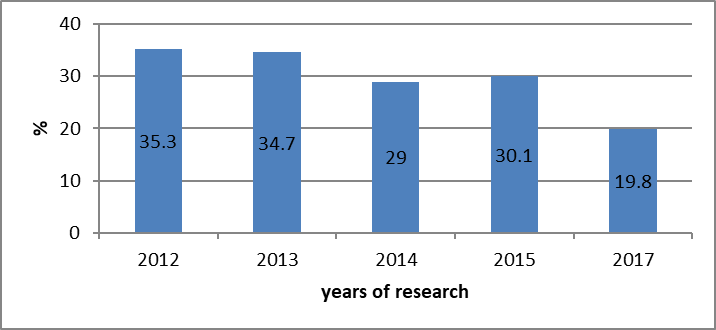
The findings of the first two studies are quite similar, then the value of the characteristic «use of a practice of the involvement in the educational process of educators from the institutions of additional education, culture and sport» decrease, at the same time the values of two further studies are also very similar. Results of the last study demonstrate the decrease of the value of this characteristic. The maximum value of the characteristic falls on the year 2012, as 705 kindergartens of all 2001 kindergartens participated on the study, that is 35.3%, involved educators from other institutions. In 2013, 1219 kindergartens out of total number of 3536 kindergartens, i.e. 34.7%, involved these specialists into the educational process. Only 29%, that are 1160 kindergartens of the total number of 3997 kindergartens used this practice of the specialist involvement in 2014. In 2015, the specialists from other institutions were involved into the educational process of 2160 (30.1%) of 7187 kindergartens participated on the study. The minimum of the value of these characteristic was reached in 2017, as it decreased by more than 10% compared to the previous study: only 19.8% of kindergartens (i.e. 1777 of all 8970 participants) involved educators from other institutions.
The findings concerning the key characteristic «availability of special equipped rooms and places for educational activity of children» are shown on the Figure
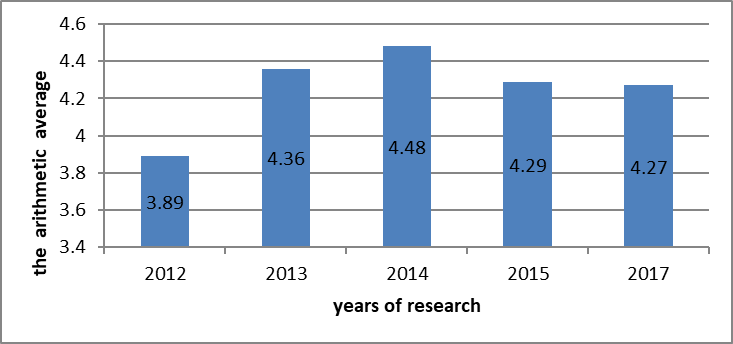
The minimum of the value of this characteristic was registered in 2012: 2001 kindergartens involved in the research had 7773 special equipped rooms and places for educational activity (i.e. an arithmetic average of 3.89 a year). In 2013, the number of special equipped rooms and places increased and amounted 15442 objects (an average of 4.36) for all 3536 kindergartens involved. In 2014, again there is an increase of the number of these objects and amounts – as a maximum of all the research years – 17896 objects (an average of 4.48) for all 3997 kindergartens. A slight decrease of the value of this characteristic appeared in 2015: 7187 kindergartens had 30263 objects (i.e. an average of 4.29). The value of the characteristic slightly decreased in 2017: 8970 kindergartens involved in total 38199 special equipped rooms and places for educational activity of children (i.e. an average of 4.27).
The dynamics of the key characteristic «availability of special equipped rooms and places for gaming activity of children» are present on the Figure
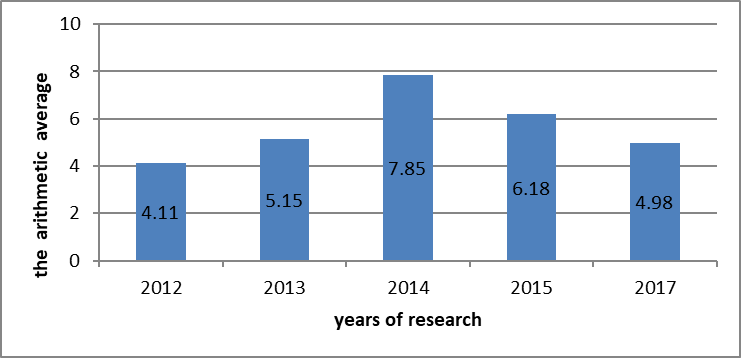
The minimum of the characteristic value, i.e. an average of 4.11, was registered in 2012, as 8209 special equipped rooms and places for gaming activity were available in 2001 pre-school educational institutions participating on the study. A slight increase of the value of this characteristic was observed for the year 2013: 18214 these objects were present in 3536 kindergartens (i.e. an average of 5.15). In 2014, a maximum of the characteristic value of 31006 special equipped rooms and places for gaming activity of children, that is an average arithmetic amount of 7.85, was registered in 3997 kindergartens. The year 2015 was characterized by the decrease of the value of this characteristic. So, 7187 kindergartens had 43705 special rooms and places, and the average value of them amounted 6.18. In 2017 the value of this characteristic decreased even more: only 444557 concidered objects were available in 8970 kindergartens and therefore they averaged 4.98.
The findings concerning the key characteristic «application of IT tools and sources in the course of education» are shown on the Figure
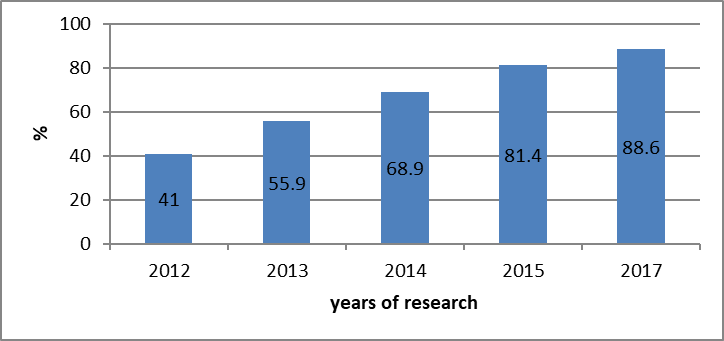
The amount of this key characteristic shows from year to year a stable growth in intensity. The minimum of characteristic was registered in 2012, as only 821 pre-school educational institutions out of 2001 institutions participated in the study, that is only 41% of kindergartens, used IT tools and sources in the educational activity. The characteristic value increased in 2013 at 15% and amounts 55.9%: 2378 of 3536 kindergartens applied IT tools and sources. The similar increase in number of kindergarten using these tools was observed for the year 2014: 2775 (i.e. 68.9%) of the total number of 3997 kindergartens. The value of this characteristic increased in 2015 at almost the same percentage as in the previous year. The 5852 pre-school institutions of all participated 7187 institutions, that is 81.4%, used IT tools and sources. The maximum was riched in 2017: computers and further electronic devices were applied by 7949, that is 88.6% of total number of 8970 kindergartens.
Results obtained regarding the key characteristic «number of offered additional educational services» are present on the Figure
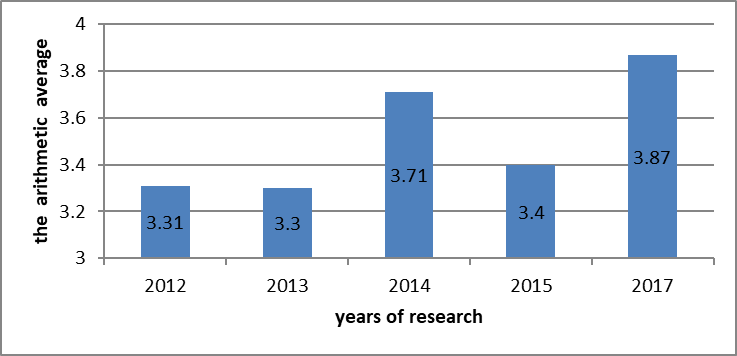
The average amount of supplied additional educational services fluctuates from 3 to 4, as it can be concluded from the Figure
The dynamics of results concerning the key characteristic «requirement offered additional educational services» is present on the Figure
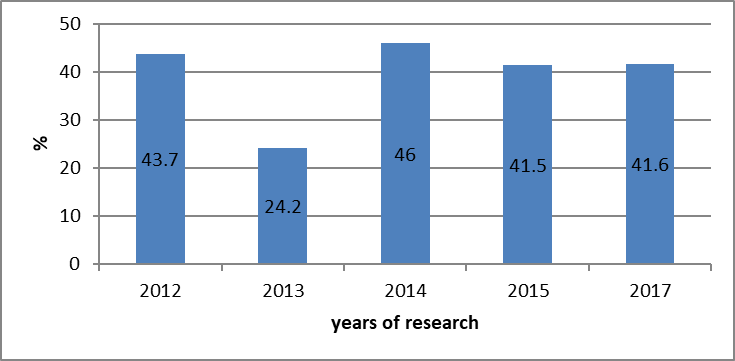
As it can be concluded from the Figure
Conclusion
The findings of the present study show an increase of values of key characteristics «application of computers and digital resources in the course of education» and «number of supplied additional educational services» what indicates the enrichment and expansion of traditional forms of pre-school education as well as the emergence (development) of other opportunities for presenting figurative information and the expanding of individual learning opportunities. At the same time, the percentage of children regarding the characteristic «requirement of additional educational services» has decreased in recent years. The comparison of this trend with the gradually increasing number of educational services realized in kindergartens raises questions about the relevance and content of the services provided.
Most of the characteristics under consideration are not characterized by definite changes, such as the characteristic « presence of full-time educating psychologists in a pre-school educational institution» which shows a significant decrease in values compared to the results of the year 2012. Two characteristics concerning the number of special equipped rooms and places for educational and gaming activity of children (excluding group rooms) have a similar trend: the initial growth of characteristic value is replaced by a smooth decrease. The trend of recent years is, of course, a cause for concern because of its negative impact on the whole potential of a kindergarten to provide a widespread variability in the game and in the educational process alike.
The definitely negative trend is observed only regarding the characteristic «use of a practice of the involvement in the educational process of educators from the institutions of additional education, culture and sport». This fact unfortunately, indicates a decrease in the opportunity of kindergartens to expand their human resources capacity and reduces also the list of the provided educational services.
References
- Asmolov, A.G., Kudriavtsev, V.T. (2016). Doshkol'noe obrazovanie v rezhime innovacij, Obruch, 1 Retrieved from http://www.obruch.ru/index.php?id=8&n=92&r=2
- Buianov, A.A. (2018). Psihologo-pedagogicheskie usloviya doshkol'nogo obrazovaniya. Moscow: Belyj veter.
- Ippolitova N.V. & Sterkhova N.S. (2012). Analiz ponyatiya «pedagogicheskie usloviya»: sushchnost', klassifikaciya, General and Professional Education, 1, 8-14.
- Rubtsov, V.V. & Iudina, E.G. (2010). Sovremennye problemy doshkol'nogo obrazovaniya. Psihologicheskaya nauka i obrazovanie, 3, 5-9.
- Sleptsova, I.F. (2018). Ocenka kachestva doshkol'nogo obrazovaniya v usloviyah variativnosti // Doshkol'noe vospitanie, 1. 13-20
Copyright information

This work is licensed under a Creative Commons Attribution-NonCommercial-NoDerivatives 4.0 International License.
About this article
Publication Date
23 November 2018
Article Doi
eBook ISBN
978-1-80296-048-8
Publisher
Future Academy
Volume
49
Print ISBN (optional)
-
Edition Number
1st Edition
Pages
1-840
Subjects
Educational psychology, child psychology, developmental psychology, cognitive psychology
Cite this article as:
Volosovets, T., Kirillov, I., & Buyanov, A. (2018). Quality Of Psychologic And Pedagogic Conditions Of Preschool Education In Russian Regions. In S. Malykh, & E. Nikulchev (Eds.), Psychology and Education - ICPE 2018, vol 49. European Proceedings of Social and Behavioural Sciences (pp. 731-740). Future Academy. https://doi.org/10.15405/epsbs.2018.11.02.85

